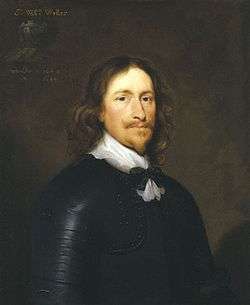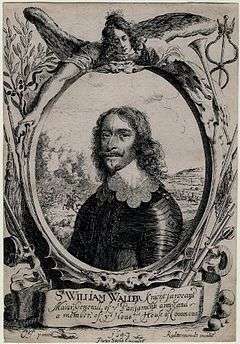William Waller
| William Waller | |
|---|---|
 General Sir William Waller by Cornelius Johnson, 1643, National Portrait Gallery, London, NPG 5819 | |
| Born |
c. 1597 Knole, Sevenoaks, Kent, England |
| Died | 19 September 1668 (aged 70–71) |
| Allegiance | Parliament |
| Rank | Major-General |
Sir William Waller (c. 1597 – 19 September 1668) was an English Parliamentary general during the English Civil War. He received his education at Magdalen Hall, Oxford, and served in the Venetian army and in the Thirty Years' War. He received a knighthood in 1622 after taking part in Vere's expedition to the Electorate of the Palatinate.
Origins and Early Commercial Ventures
William Waller was born in Knole, Sevenoaks, Kent, the son of Sir Thomas Waller and his wife Margaret Lennard, the daughter of Margaret Fiennes, 11th Baroness Dacre. His father was a descendant of the Waller family of Groombridge Place, Kent, constable of Dover Castle and member of parliament for Dover. His cousin was the Parliamentarian and regicide Hardress Waller.[1] William Waller attended Magdalen College, Oxford, but did not graduate.[2] He succeeded to the estates of his father in 1613 and was knighted on 30 June 1622.[3]
As from 1636 Waller owned a quarter-share in the Providence Island Company.[4]
Election to Parliament and early military career
In 1640 Waller was elected Member of Parliament for Andover in the Short Parliament. He was elected MP for Andover for the Long Parliament on 3 May 1642.[3]
As a strict Presbyterian by religion, and a member of the opposition in politics, he became a prominent supporter of the cause of Parliament when the Civil War broke out in 1642. He immediately received an appointment as a colonel, and successfully concluded the Siege of Portsmouth in September 1642; later in the year he commanded the forces that captured Farnham, Winchester and other key locations in the south-west of England. At the beginning of 1643 Waller was promoted to major-general and placed in charge of operations in the region of Gloucester and Bristol.[5] He concluded his first campaign in this theatre with a victory at Highnam and the capture of Hereford.

He was then called upon to oppose the advance of Sir Ralph Hopton and the Royalist western army, and though more or less defeated in the hard-fought battle of Lansdowne (near Bath) he was able to encircle Hopton in Devizes. However, Hopton and a relieving force from Oxford inflicted a crushing defeat upon Waller's army at the Battle of Roundway Down (13 July 1643). Hopton was Waller's intimate personal friend, and some correspondence passed between the opposing generals, a quotation from which (Gardiner, Civil War, i. 168) is given as illustrative of "the temper in which the nobler spirits on either side had entered on the war". Waller wrote:
- That great God who is the searcher of my heart knows with what a sad sense I go upon this service, and with what a perfect hatred I detest this war without an enemy; but I look upon it as sent from God . . . God in his good time send us the blessing of peace and in the meantime assist us to receive it! We are both upon the stage and must act such parts as are assigned us in this tragedy, let us do it in a way of honour and without personal animosities.
The destruction of his army at Roundway scarcely affected Waller's military reputation, many reproaching Essex, the commander-in-chief, for allowing the Oxford royalists to turn against Waller. The Londoners, who had called him "William the Conqueror", recognised his skill and energy so far as willingly to raise a new army for him in London and the south-eastern counties.
From 7th to 9th of August 1643, there were some popular demonstrations at Westminster. An anti-war demonstration by London women turned violent, and was suppressed by Waller's regiment of horse. Many women were beaten and some even killed in the melee.[6]
Waller's career became one of gradual disillusionment. His new forces were distinctively local, and, like other local troops on both sides, resented long marches and hard work far from their own counties. Only at moments of imminent danger could they be trusted to do their duty. At ordinary times, such as at the first siege of Basing House, they mutinied in face of the enemy, deserted and even marched home in formed bodies under their own officers, and their gallantry at critical moments, such as the surprise of Alton and the skirmish at the Church of St Lawrence in December 1643 and the recapture of Arundel in January 1644, only partially redeemed their general bad conduct.
Waller himself, a general of the highest skill — "the best shifter and chooser of ground" on either side - was, like Turenne, at his best at the head of a small and highly disciplined regular army. Only a Condé or a Cromwell could have enforced discipline and soldierly spirit in such men, ill-clad and unpaid as they were, and the only military quality lacking to Waller was precisely this supreme personal magnetism.
In these circumstances affairs went from bad to worse. Though successful in stopping Hopton's second advance at Cheriton in March 1644, he was defeated by Charles I in the war of manoeuvre which ended with the action of Cropredy Bridge (June 1644), and at the Second Battle of Newbury in October his tactical success at the village of Speen led to nothing. His last expeditions were made into the west for the relief of Taunton, and in these he had Cromwell as his lieutenant-general.
The New Model Army and later career
By this time the confusion in all the armed forces of the parliament had reached such a height that reforms were at last taken in hand. The original suggestion of the celebrated "New Model Army" came from Waller, who wrote to the Committee of Both Kingdoms on 2 July 1644 that "an army compounded of these men will never go through with your service, and till you have an army merely your own that you may command, it is in a manner impossible to do anything of importance."
Simultaneously with the New Model came the Self-denying Ordinance, which required all members of parliament to lay down their military commands. As he had already requested to be relieved, Waller did so gladly and his active military career came to an end. But the events of 1643 - 1644 had done more than embitter him. They had combined with his Presbyterianism to make him intolerant of all that he conceived to be licence in church, state or army, and after he ceased to exercise command himself he was constantly engaged, in and out of parliament, in opposing the Independents and the army politicians, and supporting the cause of his own religious system, and later that of the Presbyterian-Royalist opposition to the Commonwealth and Protectorate régime. He was several times imprisoned between 1648 and 1659.
Postwar career and death
In 1654 he bought Osterley Park.
In the latter year Waller worked actively in promoting the final negotiations for the restoration of Charles II and reappeared in the House of Commons. He sat in the Convention Parliament, but soon retired from political life.[3] He died on 19 September 1668.
Marriages and progeny
Sir William Waller married three times:
- Firstly in 1622 to Jane Reynell (d.1633), only daughter and heiress of Sir Richard Reynell (d.1633) of Forde, Wolborough, Devon, where he had built a new mansion in about 1610. Jane died in 1633 after giving birth to the following progeny:
- Richard Waller (b.1632), only son, heir to his grandfather Sir Richard Reynell (d.1633)[7]
- Margaret Waller (d.1694), eventual heiress of her brother at Forde, Wolborough, Devon. She married Sir William Courtenay, 1st Baronet (1628–1702), of Powderham,[8] to which family she brought the estate of Forde. Her descendants became Viscounts Courtenay and Earls of Devon
- Secondly to Anne Finch, daughter of Thomas Finch, 2nd Earl of Winchilsea by whom he had four further children, including:
- William Waller, MP for Westminster in 1680.
- Thirdly, in 1652, to Anne, widow of Sir Simon Harcourt.[9]
References
- ↑ The Dormant and Extinct Baronage of England, Thomas Christopher Banks, London, 1808
- ↑ Vindication of the Character and Conduct of Sir William Waller, Knight, William Waller, Great Britain, 1793
- 1 2 3 History of Parliament Online - Waller, William
- ↑ Ordahl Kupperman, K, Providence Island 1630-1641, "The Other Puritan Colony", 1993, Cambridge University Press, ISBN 0-521-55835-2
- ↑ 'February 1643: Ordinance to appoint Sir William Waller Serjeant Major General of the Forces in Gloucester and other adjacent Counties, and for paying his Army.', Acts and Ordinances of the Interregnum, 1642-1660 (1911), pp. 79-80. URL: http://www.british-history.ac.uk/report.asp?compid=55779. Date accessed: 13 April 2007.
- ↑ 1643 timeline. British Civil Wars, Commonwealth & Protectorate website
- ↑ Vivian, Visitations of Devon, p.643, pedigree of Reynell
- ↑ Vivian, Visitations of Devon, p.247, pedigree of Courtenay
- ↑ Donagan, Barbara. "Waller, Sir William". Oxford Dictionary of National Biography (online ed.). Oxford University Press. doi:10.1093/ref:odnb/28561. (Subscription or UK public library membership required.)
- Attribution
 This article incorporates text from a publication now in the public domain: Chisholm, Hugh, ed. (1911). "Waller, Sir William". Encyclopædia Britannica. 28 (11th ed.). Cambridge University Press. pp. 283, 284. Endnotes:
This article incorporates text from a publication now in the public domain: Chisholm, Hugh, ed. (1911). "Waller, Sir William". Encyclopædia Britannica. 28 (11th ed.). Cambridge University Press. pp. 283, 284. Endnotes:
- Wood's Athenae Oxonienses, ed. Bliss, iii. 812;
- Two partial autobiographies
- Recollections by General Sir William Waller (printed in The Poetry of Anna Matilda, 1788), and
- Vindication of the Character, &c. (1797).
- Also published (book by Waller):
- Divine Meditations upon Several Occasions: with a Daily Directory ... To which is prefixed, a short account of Sir William Waller and his times, chiefly extracted from a MS. written by himself (1839 reprint of items published in 1680 and 1793)
Further reading
| Wikisource has the text of the 1885–1900 Dictionary of National Biography's article about Waller, William (1597?-1668). |
- Adair, John (1997), Roundhead General: the Campaigns of Sir William Waller, Thrupp, Gloucestershire: Sutton, ISBN 0-7509-1312-6
- Plant, David (7 August 2010), Biography of Sir William Waller, British Civil Wars and Commonwealth website, retrieved July 2012 Check date values in:
|access-date=(help)
| Parliament of England | ||
|---|---|---|
| Preceded by Francis Gerard Chaloner Chute |
Member of Parliament for Middlesex 1660–1661 With: Sir Lancelot Lake |
Succeeded by Sir Lancelot Lake Sir Thomas Allen |